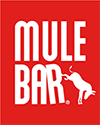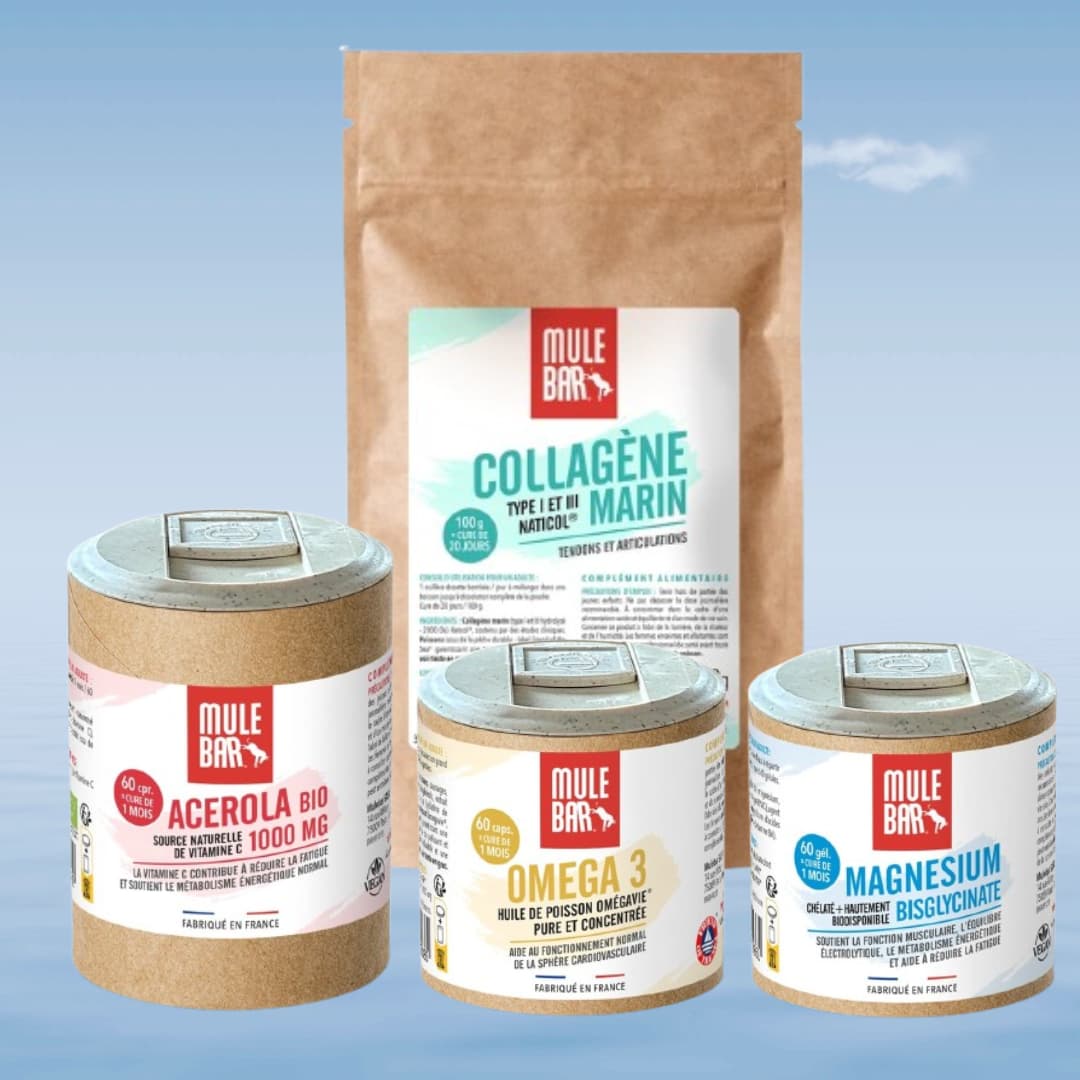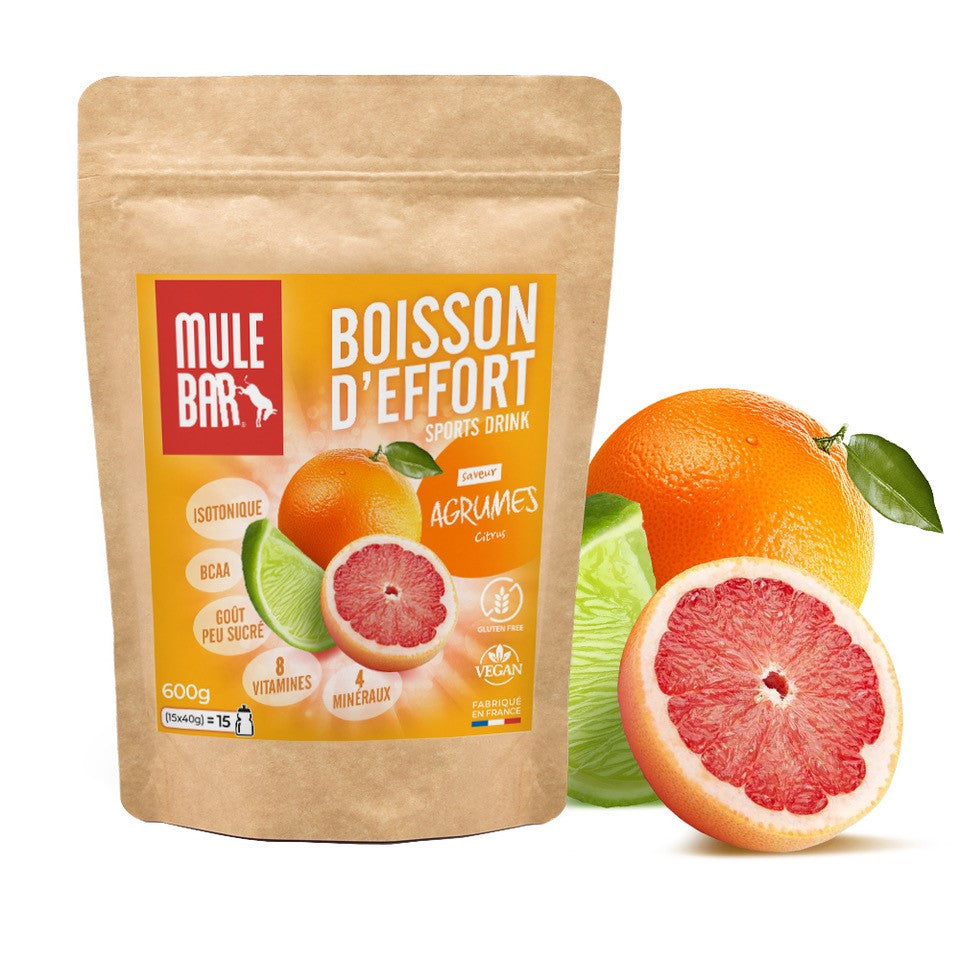
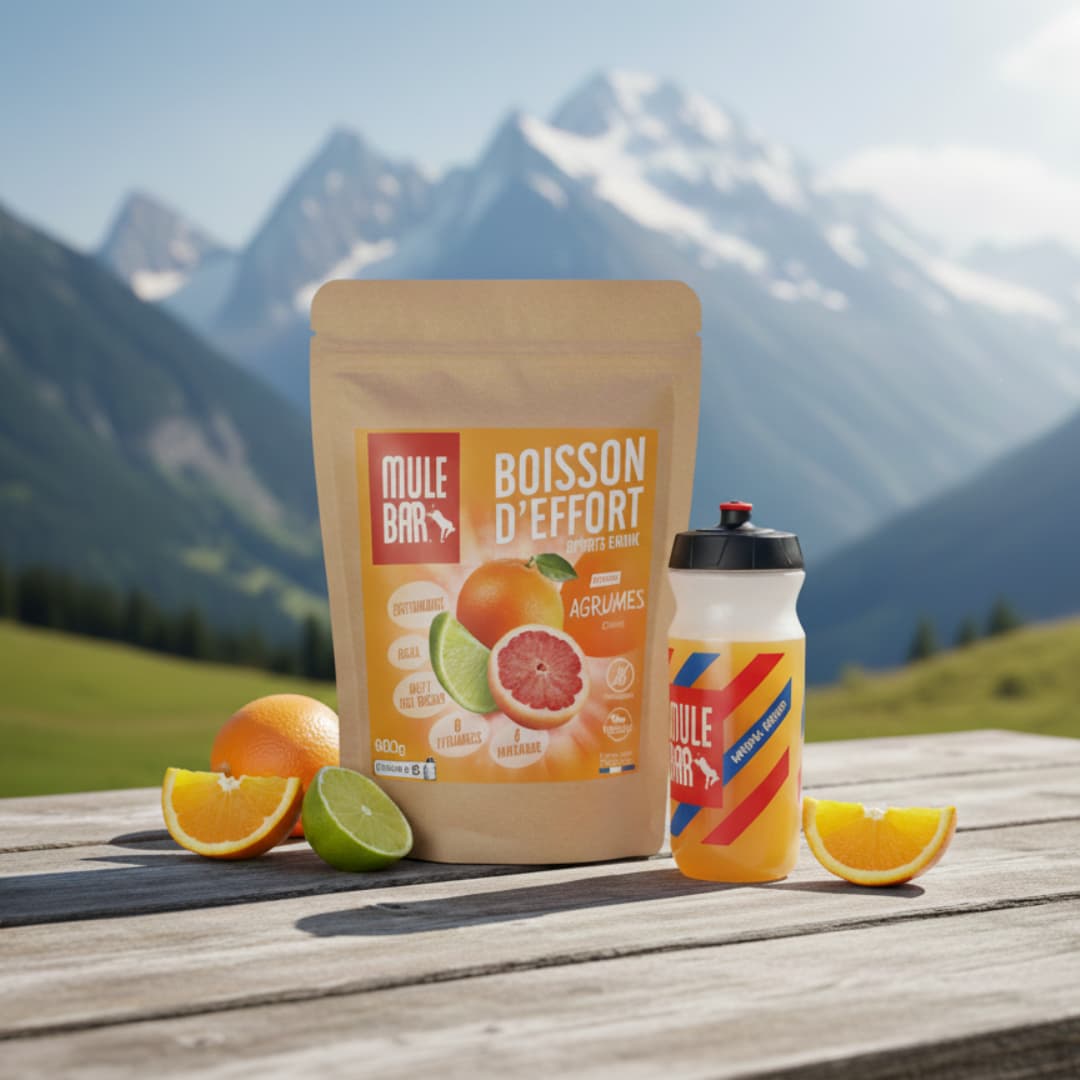
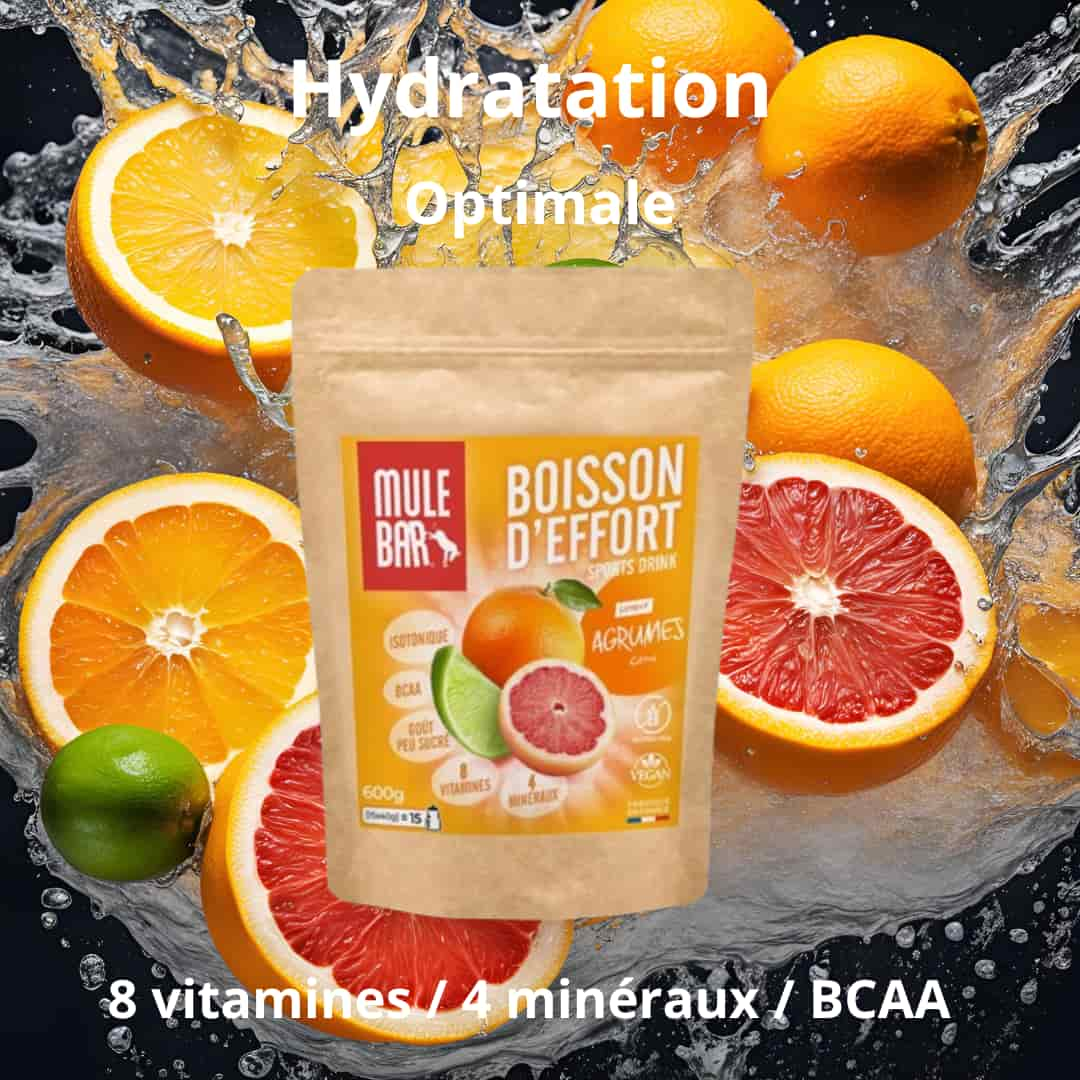
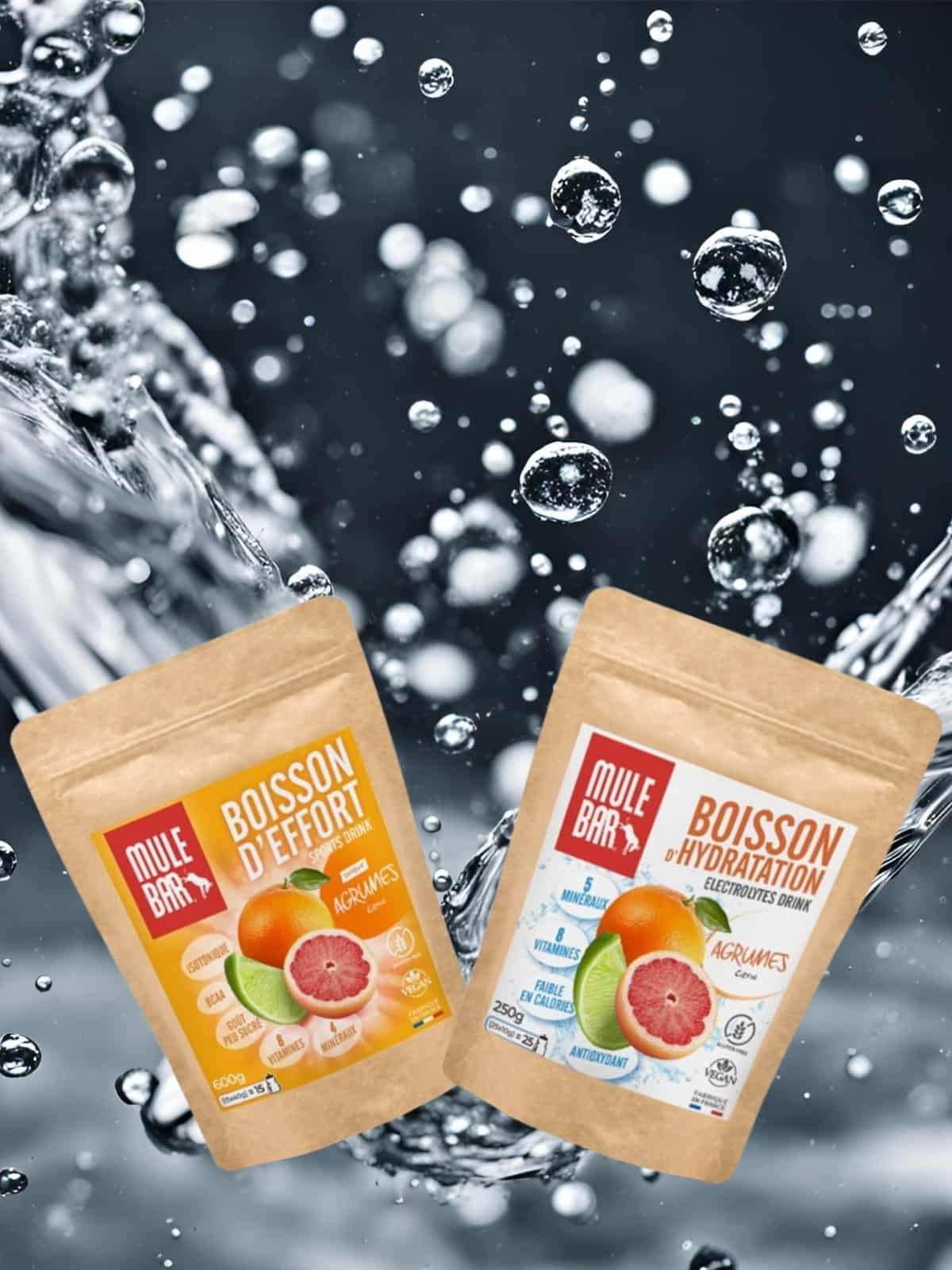
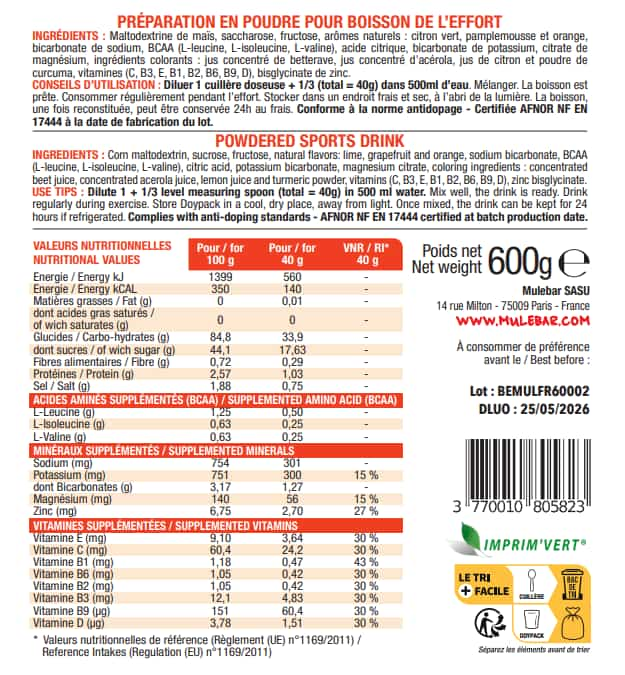
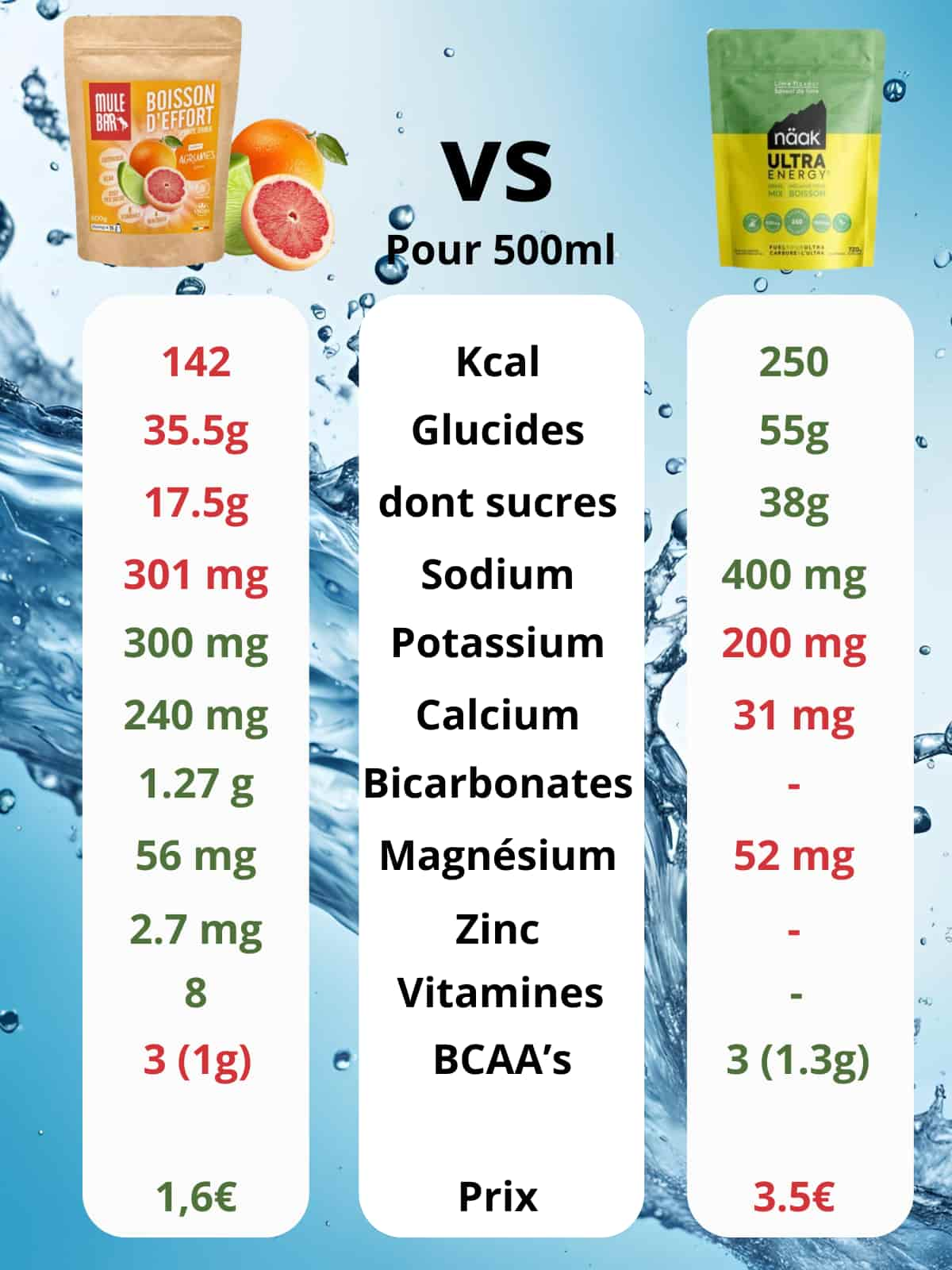
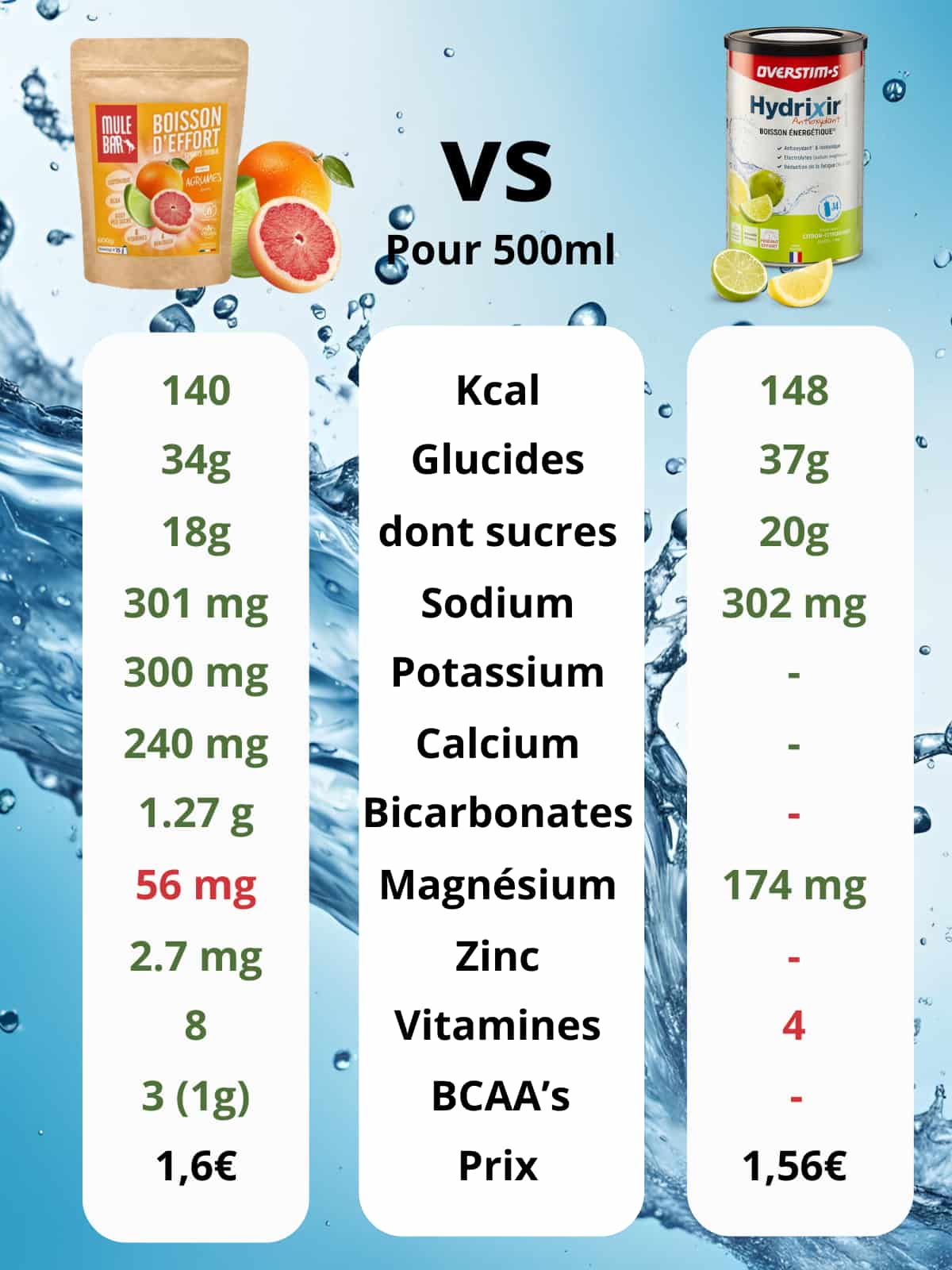
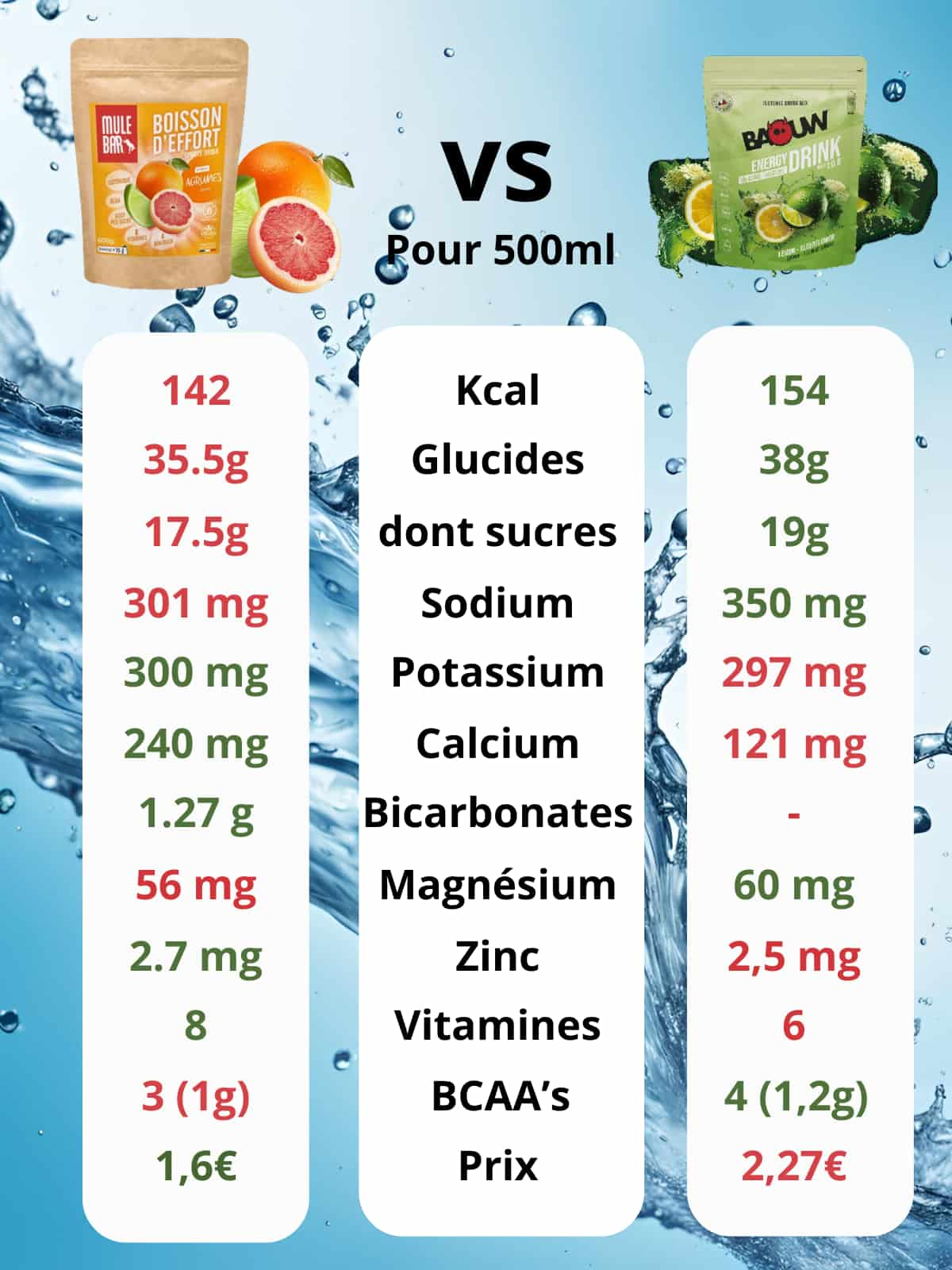
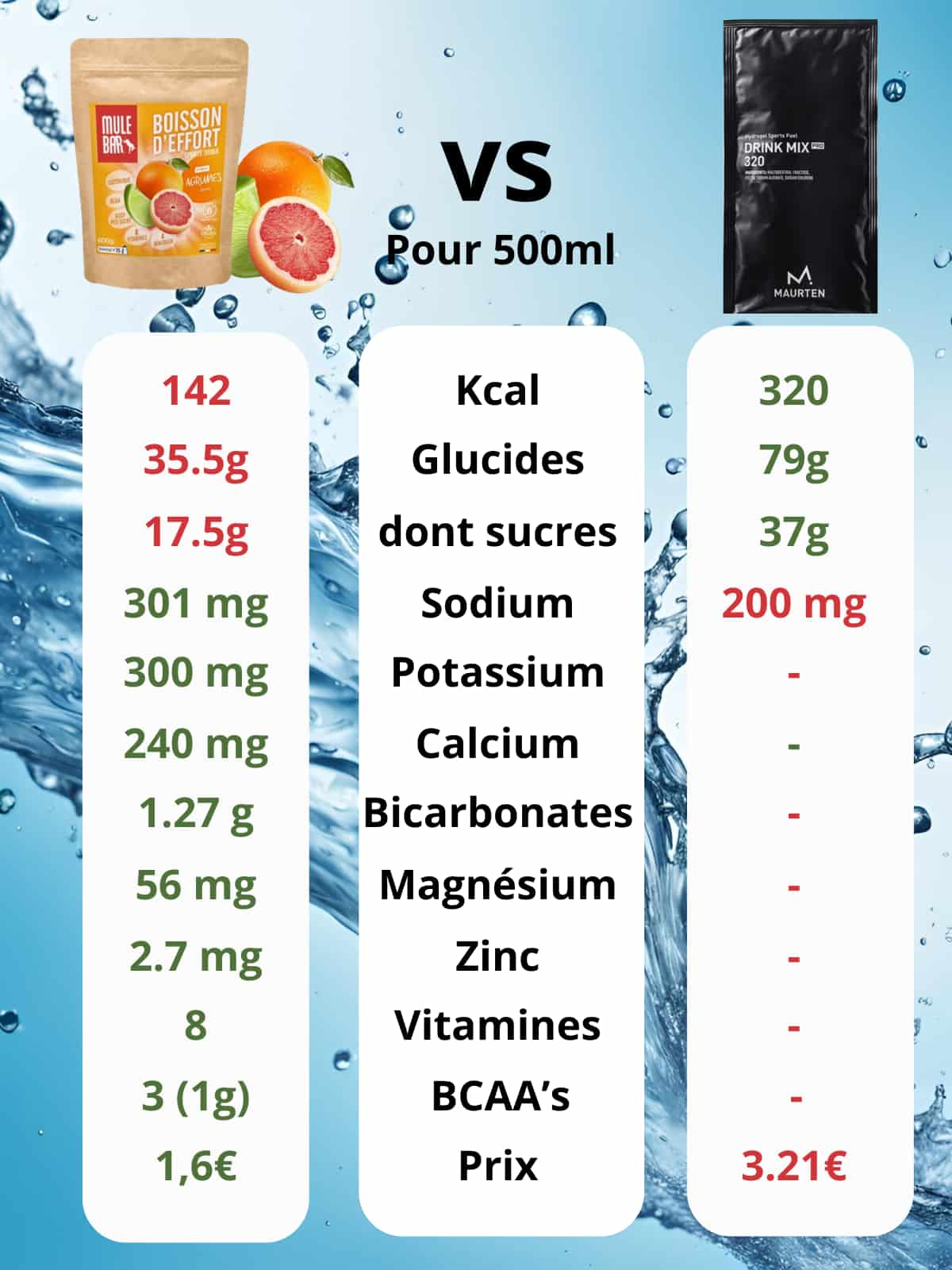
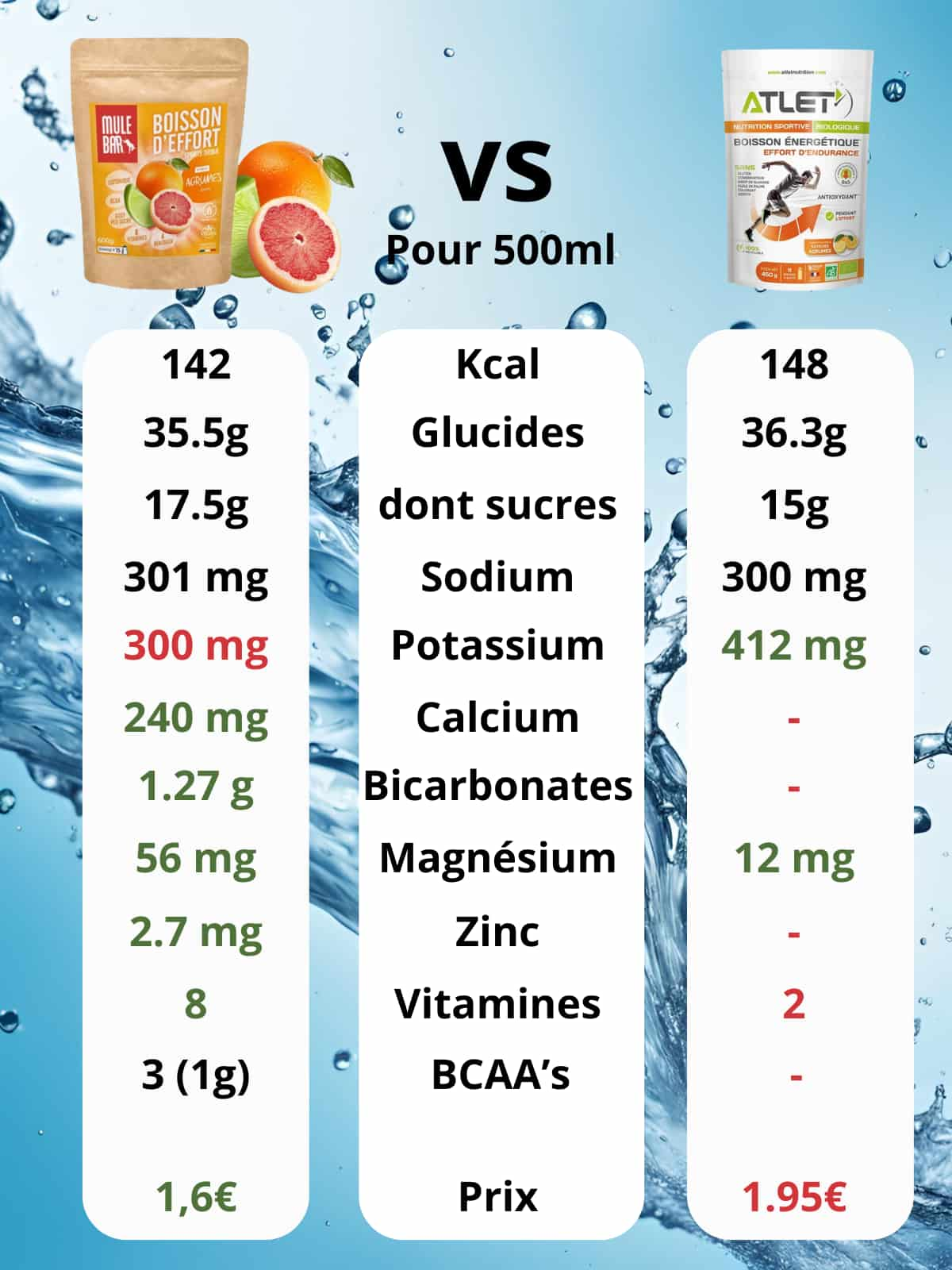
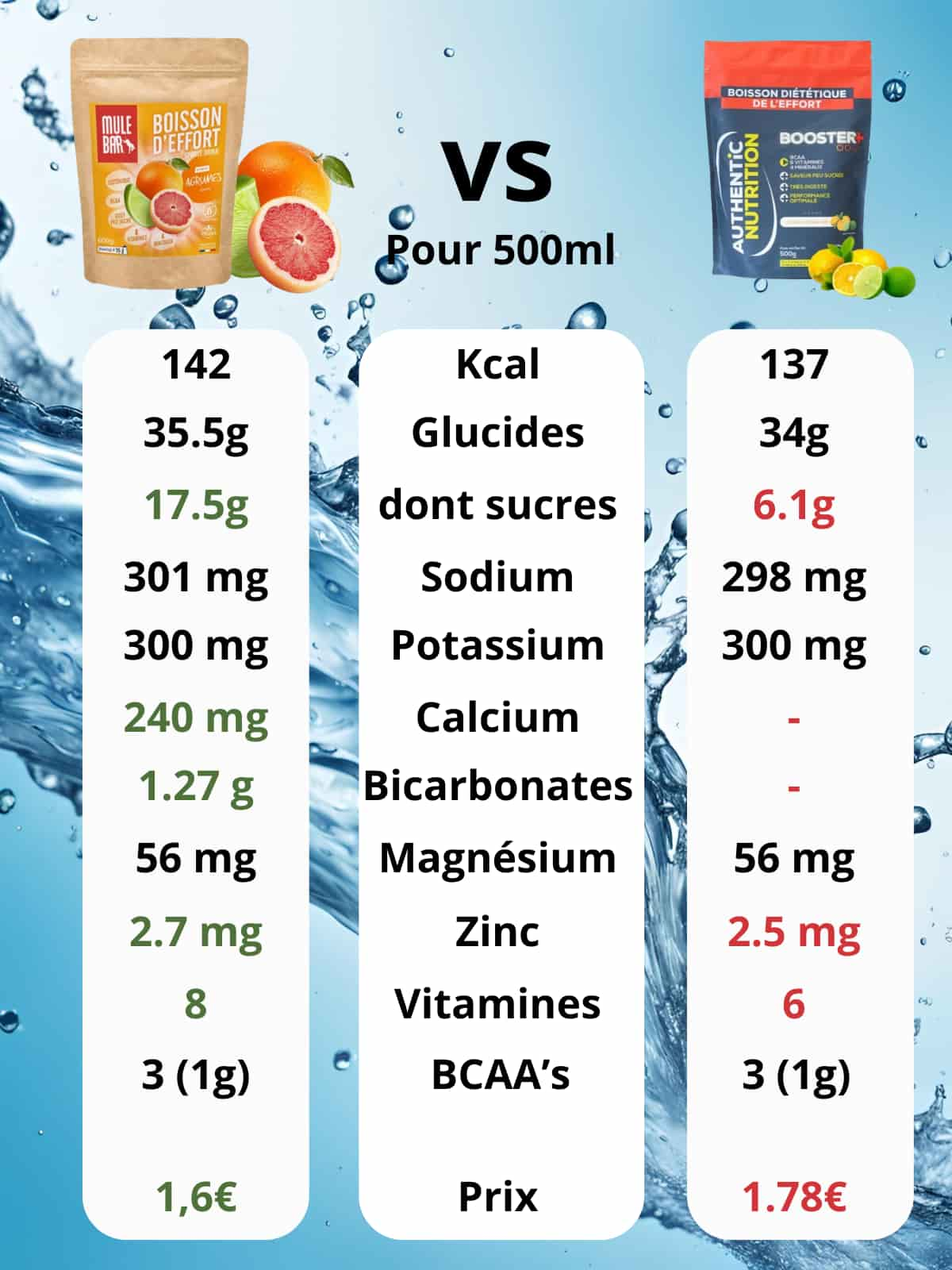
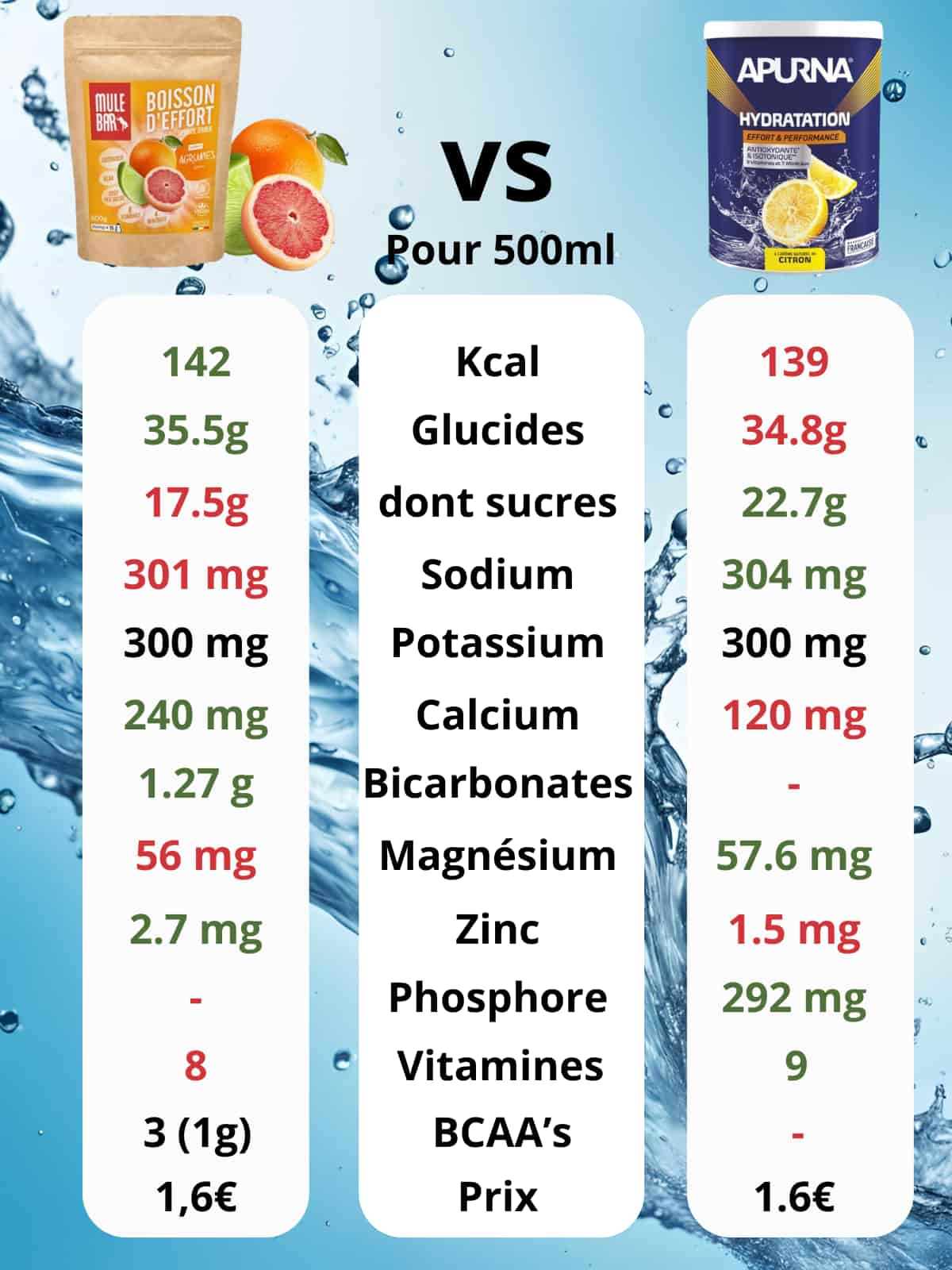
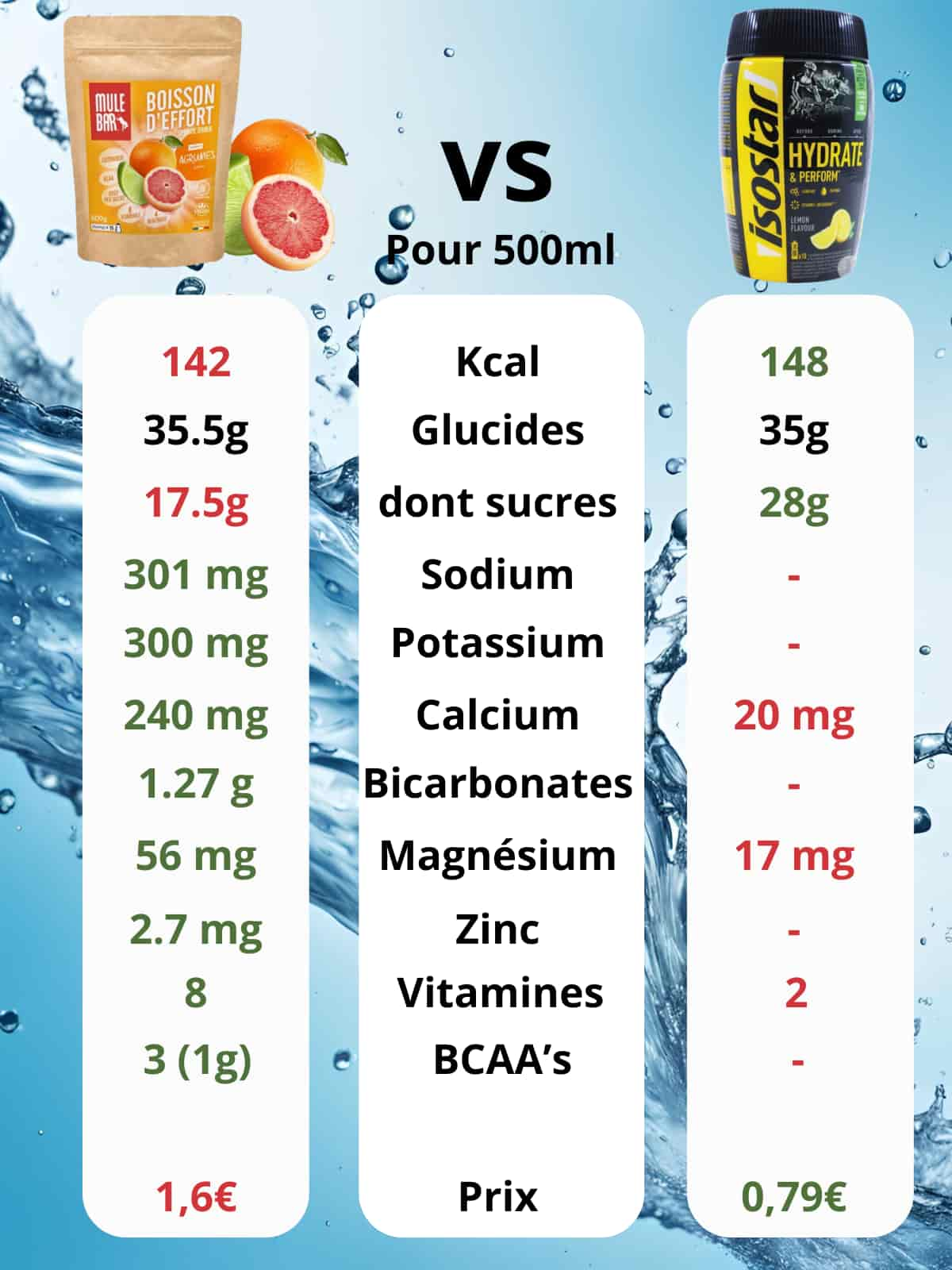

Mulebar energy drink 600g / Citrus
- Isotonic, 4 minerals, 8 vitamins, BCAA's and bicarbonate
- Plant based and gluten free
- AFNOR NF EN 17444 anti-doping label
- Made in France
- 600g = 15 doses of 40g = 15 cans of 500ml
- 2 to 5 working days delivery in Europe
- Best before : April 15th 2027

Description
This Mulebar endurance drink was designed with the French specialist in sports drink formulation. He supplies numerous professional teams in football, basketball, cycling, and rugby as well as many marathoners, trail runners, and triathletes with customized formulations. You can easily compare in the photos of this product sheet the major differences in formulation and dosages with the main brands on the market. Our guideline is that one bottle provides 1/3 of the RDI (Recommended Daily Intake) for each vitamin. There is no need to overdose when consuming several bottles a day.
An endurance drink, also known as an energy drink, fulfills a double objective during physical effort:
- Provide constant energy (without glycemic peak) and ensure good metabolism (maintenance of glycogen stores).
- Provide minerals and trace elements (electrolytes), amino acids (BCAA), and vitamins to compensate for losses due to sweating and promote water absorption in the body.
Here are its main characteristics which are detailed in the "benefits" tab:
- Isotonic drink. This means it has the same concentration as blood. It is therefore very easily absorbed. A drink that is too concentrated (hypertonic) slows down digestion and limits hydration. A drink that is too diluted (hypotonic) promotes hydration but at the expense of nutrient absorption.
- Tri-source energy supply (maltodextrin, sucrose, and fructose) for both rapid and long-lasting energy release (35.5g of carbohydrates per serving) but only 17.5g of sugar to avoid nausea after several hours.
- 4 minerals (sodium, magnesium, potassium, zinc) to compensate for minerals lost through sweating and maintain good water balance (prevention of cramps).
- 8 vitamins (B1, B2, B3, B6, C, D, E) to reduce muscle fatigue and promote better metabolism (energy production).
- BCAA amino acids (Leucine, Isoleucine, Valine) to facilitate post-exercise muscle recovery.
- Bicarbonate to counteract the undesirable effects of lactic acid in muscle cells.
- Pleasant fruity flavors.
Unlike some energy drinks, Mulebar endurance drink stands out for its natural flavors, absence of acidity and preservatives, and perfect dissolution in water. You will not have any residue at the bottom of the bottle, often the cause of gastric problems when absorbed.
Finally, its Doypack packaging allows both perfect preservation (protection against air and light), minimal bulk without using plastic.
Benefits
A tri-sources energy supply:
It provides both a quick release of energy that lasts over time, composed of:
- Maltodextrin: It is a quick source of energy. It is often consumed before, during, and after physical exercise to replenish muscle glycogen stores and improve athletic performance. Maltodextrin is also used for hydration during long-duration efforts (endurance sports) and to promote better muscle recovery. Our maltodextrin has a D.E (dextrose equivalent) of 19, which corresponds to a relatively slow energy release. Many maltodextrins have very high D.E, causing glycemic peaks. Few brands disclose this figure because it is generally very high.
- Sucrose (or saccharose): It is a sugar derived from sugar beet or sugar cane, mainly found in table sugar. Composed of fructose and glucose, its main virtue is to provide energy.
- Fructose: Its sweetening power is higher than sucrose. It is very easily digested by the liver.
BCAA (amino acids):
BCAAs are among the 9 essential amino acids. They are involved in the production of proteins that the body cannot manufacture. Thus, the body obtains them through diet and supplementation. They have a significant impact on muscle development. They contribute to muscle regeneration and promote good recovery after exercise.
- Leucine: It contributes to muscle mass building. It mainly helps slow down the degradation of muscle cells caused by oxidative stress. This stress is more significant as physical effort is intense due to greater oxygenation of the blood.
- Isoleucine: It is a source of energy for muscles. It promotes muscle growth by stimulating their sugar consumption.
- Valine: It helps build muscles by facilitating the transport of glucose to muscle cells during effort.
A cocktail of 8 vitamins, each with their benefits:
B group vitamins:
They facilitate energy metabolism, which is the release of energy contained in food. They also prevent intellectual fatigue by stimulating the central nervous system. Most B vitamins are not stored in sufficient quantities in the body.
- Vitamin B1 (Thiamine): Helps convert carbohydrates into energy. It is essential for the proper functioning of muscles, including the heart muscle. Recommended daily intake for an adult: 1.1 mg
- Vitamin B2 (Riboflavin): Also helps release energy from food. It contributes to the normal metabolism of iron and maintaining normal red blood cell levels in the blood. Therefore, it aids the proper functioning of the central nervous system and reduces fatigue. Recommended daily intake for an adult: 1.4 mg
- Vitamin B3 (Niacin): Helps the proper functioning of the nervous system. Recommended daily intake for an adult: 16 mg
- Vitamin B6 (Pyridoxine): It is involved in the metabolism of several amino acids and contributes to red blood cell production. It supports proper energy metabolism and reduces fatigue. Recommended daily intake for an adult: 1.4 mg
- Vitamin B9 (Folic acid): Contributes to red blood cell production and their oxygenation. It helps reduce fatigue. Recommended daily intake for an adult: 200µg
Vitamin C (Ascorbic acid):
It is a powerful antioxidant that helps fight oxidative stress (cell aging). It also plays a vital role in the transport and absorption of iron in the intestine, promoting digestion. Finally, it supports proper energy metabolism. Recommended daily intake for an adult: 80 mg
Vitamin D (Calciferol):
Essential for the quality of bone and muscle tissue and for strengthening the immune system. Recommended daily intake for an adult: 3.1µg
Vitamin E (Alpha-tocopherol):
It plays a crucial role in protecting cell membranes. Its antioxidant function helps neutralize free radicals and reduce the oxidation of low-density lipoproteins, often associated with cardiovascular diseases. Recommended daily intake for an adult: 12 mg
4 minerals to replenish stocks lost through sweating:
- Sodium (Na): Regulates blood pressure, helps maintain fluid balance, and supports the proper functioning of muscles and nerves. Recommended daily intake for an adult: 2000 mg or 5g of salt
- Potassium (K): Supports the proper functioning of the nervous system, normal muscle function, and maintaining normal blood pressure. Recommended daily intake for an adult: 3500 mg
- Magnesium (Mg): Participates in electrolyte balance and energy metabolism. It supports the proper functioning of the nervous and muscular systems and contributes to the health of bones and teeth. Recommended daily intake for an adult: 350 mg for men and 300 mg for women
- Zinc (Zn): This trace element, although present in small amounts in the human body, is involved in the activity of over 300 enzymes. It plays a role in stimulating the immune system, hormone synthesis, and combating cell aging. Recommended daily intake for an adult: 11 mg for men and 8 mg for women. For vegans, it's 13 mg and 11 mg.
Bicarbonates:
They help counteract muscle acidity caused by physical effort (lactic acid), prevent cramps, and promote better recovery. They also support lean mass gain.
Usage tips
Dosage: 1 spoon + 1/3 ie 40g per 500ml bottle.
It is imperative to start hydrating well several hours before your effort. It is then advised to maintain constant hydration and blood sugar levels by drinking a sip regularly, for example, every 15 minutes, without waiting to feel thirsty as it will be too late to avoid cramps.
The human body hates the 'yo-yo' effect. This is why our energy gels come with a resealable cap for fractional consumption.
We recommend drinking at least one 500ml bottle per hour. The needs of each athlete will vary depending on the type of sport practiced, its intensity, body size, or outside temperature. It is during your training sessions that you can gradually create your hydration routine.
This Mulebar endurance drink was designed with the French specialist in sports drink formulation. He supplies numerous professional teams in football, basketball, cycling, and rugby as well as many marathoners, trail runners, and triathletes with customized formulations. You can easily compare in the photos of this product sheet the major differences in formulation and dosages with the main brands on the market. Our guideline is that one bottle provides 1/3 of the RDI (Recommended Daily Intake) for each vitamin. There is no need to overdose when consuming several bottles a day.
An endurance drink, also known as an energy drink, fulfills a double objective during physical effort:
- Provide constant energy (without glycemic peak) and ensure good metabolism (maintenance of glycogen stores).
- Provide minerals and trace elements (electrolytes), amino acids (BCAA), and vitamins to compensate for losses due to sweating and promote water absorption in the body.
Here are its main characteristics which are detailed in the "benefits" tab:
- Isotonic drink. This means it has the same concentration as blood. It is therefore very easily absorbed. A drink that is too concentrated (hypertonic) slows down digestion and limits hydration. A drink that is too diluted (hypotonic) promotes hydration but at the expense of nutrient absorption.
- Tri-source energy supply (maltodextrin, sucrose, and fructose) for both rapid and long-lasting energy release (35.5g of carbohydrates per serving) but only 17.5g of sugar to avoid nausea after several hours.
- 4 minerals (sodium, magnesium, potassium, zinc) to compensate for minerals lost through sweating and maintain good water balance (prevention of cramps).
- 8 vitamins (B1, B2, B3, B6, C, D, E) to reduce muscle fatigue and promote better metabolism (energy production).
- BCAA amino acids (Leucine, Isoleucine, Valine) to facilitate post-exercise muscle recovery.
- Bicarbonate to counteract the undesirable effects of lactic acid in muscle cells.
- Pleasant fruity flavors.
Unlike some energy drinks, Mulebar endurance drink stands out for its natural flavors, absence of acidity and preservatives, and perfect dissolution in water. You will not have any residue at the bottom of the bottle, often the cause of gastric problems when absorbed.
Finally, its Doypack packaging allows both perfect preservation (protection against air and light), minimal bulk without using plastic.
A tri-sources energy supply:
It provides both a quick release of energy that lasts over time, composed of:
- Maltodextrin: It is a quick source of energy. It is often consumed before, during, and after physical exercise to replenish muscle glycogen stores and improve athletic performance. Maltodextrin is also used for hydration during long-duration efforts (endurance sports) and to promote better muscle recovery. Our maltodextrin has a D.E (dextrose equivalent) of 19, which corresponds to a relatively slow energy release. Many maltodextrins have very high D.E, causing glycemic peaks. Few brands disclose this figure because it is generally very high.
- Sucrose (or saccharose): It is a sugar derived from sugar beet or sugar cane, mainly found in table sugar. Composed of fructose and glucose, its main virtue is to provide energy.
- Fructose: Its sweetening power is higher than sucrose. It is very easily digested by the liver.
BCAA (amino acids):
BCAAs are among the 9 essential amino acids. They are involved in the production of proteins that the body cannot manufacture. Thus, the body obtains them through diet and supplementation. They have a significant impact on muscle development. They contribute to muscle regeneration and promote good recovery after exercise.
- Leucine: It contributes to muscle mass building. It mainly helps slow down the degradation of muscle cells caused by oxidative stress. This stress is more significant as physical effort is intense due to greater oxygenation of the blood.
- Isoleucine: It is a source of energy for muscles. It promotes muscle growth by stimulating their sugar consumption.
- Valine: It helps build muscles by facilitating the transport of glucose to muscle cells during effort.
A cocktail of 8 vitamins, each with their benefits:
B group vitamins:
They facilitate energy metabolism, which is the release of energy contained in food. They also prevent intellectual fatigue by stimulating the central nervous system. Most B vitamins are not stored in sufficient quantities in the body.
- Vitamin B1 (Thiamine): Helps convert carbohydrates into energy. It is essential for the proper functioning of muscles, including the heart muscle. Recommended daily intake for an adult: 1.1 mg
- Vitamin B2 (Riboflavin): Also helps release energy from food. It contributes to the normal metabolism of iron and maintaining normal red blood cell levels in the blood. Therefore, it aids the proper functioning of the central nervous system and reduces fatigue. Recommended daily intake for an adult: 1.4 mg
- Vitamin B3 (Niacin): Helps the proper functioning of the nervous system. Recommended daily intake for an adult: 16 mg
- Vitamin B6 (Pyridoxine): It is involved in the metabolism of several amino acids and contributes to red blood cell production. It supports proper energy metabolism and reduces fatigue. Recommended daily intake for an adult: 1.4 mg
- Vitamin B9 (Folic acid): Contributes to red blood cell production and their oxygenation. It helps reduce fatigue. Recommended daily intake for an adult: 200µg
Vitamin C (Ascorbic acid):
It is a powerful antioxidant that helps fight oxidative stress (cell aging). It also plays a vital role in the transport and absorption of iron in the intestine, promoting digestion. Finally, it supports proper energy metabolism. Recommended daily intake for an adult: 80 mg
Vitamin D (Calciferol):
Essential for the quality of bone and muscle tissue and for strengthening the immune system. Recommended daily intake for an adult: 3.1µg
Vitamin E (Alpha-tocopherol):
It plays a crucial role in protecting cell membranes. Its antioxidant function helps neutralize free radicals and reduce the oxidation of low-density lipoproteins, often associated with cardiovascular diseases. Recommended daily intake for an adult: 12 mg
4 minerals to replenish stocks lost through sweating:
- Sodium (Na): Regulates blood pressure, helps maintain fluid balance, and supports the proper functioning of muscles and nerves. Recommended daily intake for an adult: 2000 mg or 5g of salt
- Potassium (K): Supports the proper functioning of the nervous system, normal muscle function, and maintaining normal blood pressure. Recommended daily intake for an adult: 3500 mg
- Magnesium (Mg): Participates in electrolyte balance and energy metabolism. It supports the proper functioning of the nervous and muscular systems and contributes to the health of bones and teeth. Recommended daily intake for an adult: 350 mg for men and 300 mg for women
- Zinc (Zn): This trace element, although present in small amounts in the human body, is involved in the activity of over 300 enzymes. It plays a role in stimulating the immune system, hormone synthesis, and combating cell aging. Recommended daily intake for an adult: 11 mg for men and 8 mg for women. For vegans, it's 13 mg and 11 mg.
Bicarbonates:
They help counteract muscle acidity caused by physical effort (lactic acid), prevent cramps, and promote better recovery. They also support lean mass gain.
Dosage: 1 spoon + 1/3 ie 40g per 500ml bottle.
It is imperative to start hydrating well several hours before your effort. It is then advised to maintain constant hydration and blood sugar levels by drinking a sip regularly, for example, every 15 minutes, without waiting to feel thirsty as it will be too late to avoid cramps.
The human body hates the 'yo-yo' effect. This is why our energy gels come with a resealable cap for fractional consumption.
We recommend drinking at least one 500ml bottle per hour. The needs of each athlete will vary depending on the type of sport practiced, its intensity, body size, or outside temperature. It is during your training sessions that you can gradually create your hydration routine.
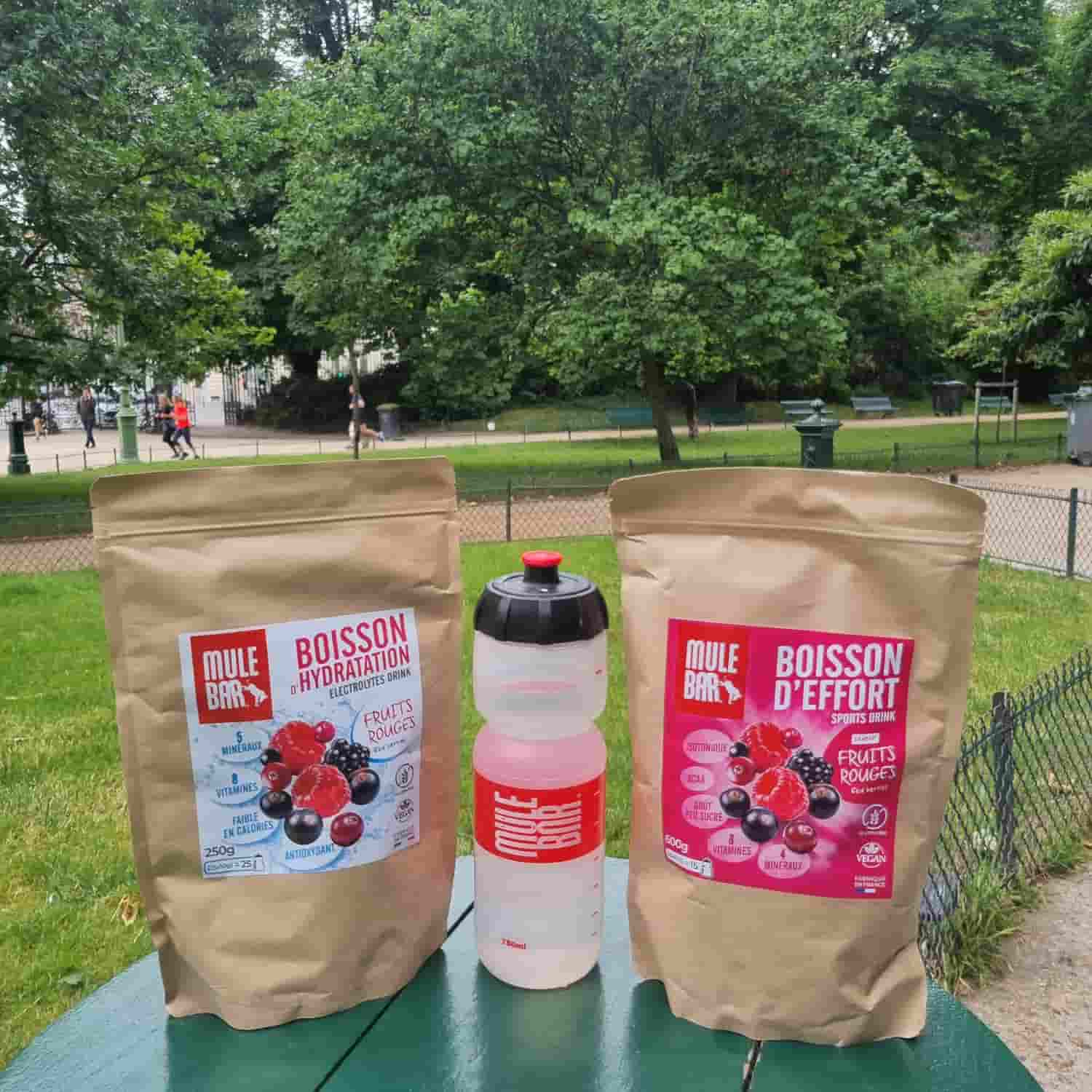
Ingredients
Corn maltodextrin, sucrose, fructose, natural flavours: lime, grapefruit and orange, sodium bicarbonate, BCAA (L-leucine, L-isoleucine, L-valine), citric acid, potassium bicarbonate, magnesium citrate, colouring ingredients : concentrated beetroot juice, concentrated acerola juice, lemon juice and turmeric powder, vitamins (C, B3, E, B1, B2, B6, B9, D), zinc bisglycinate.
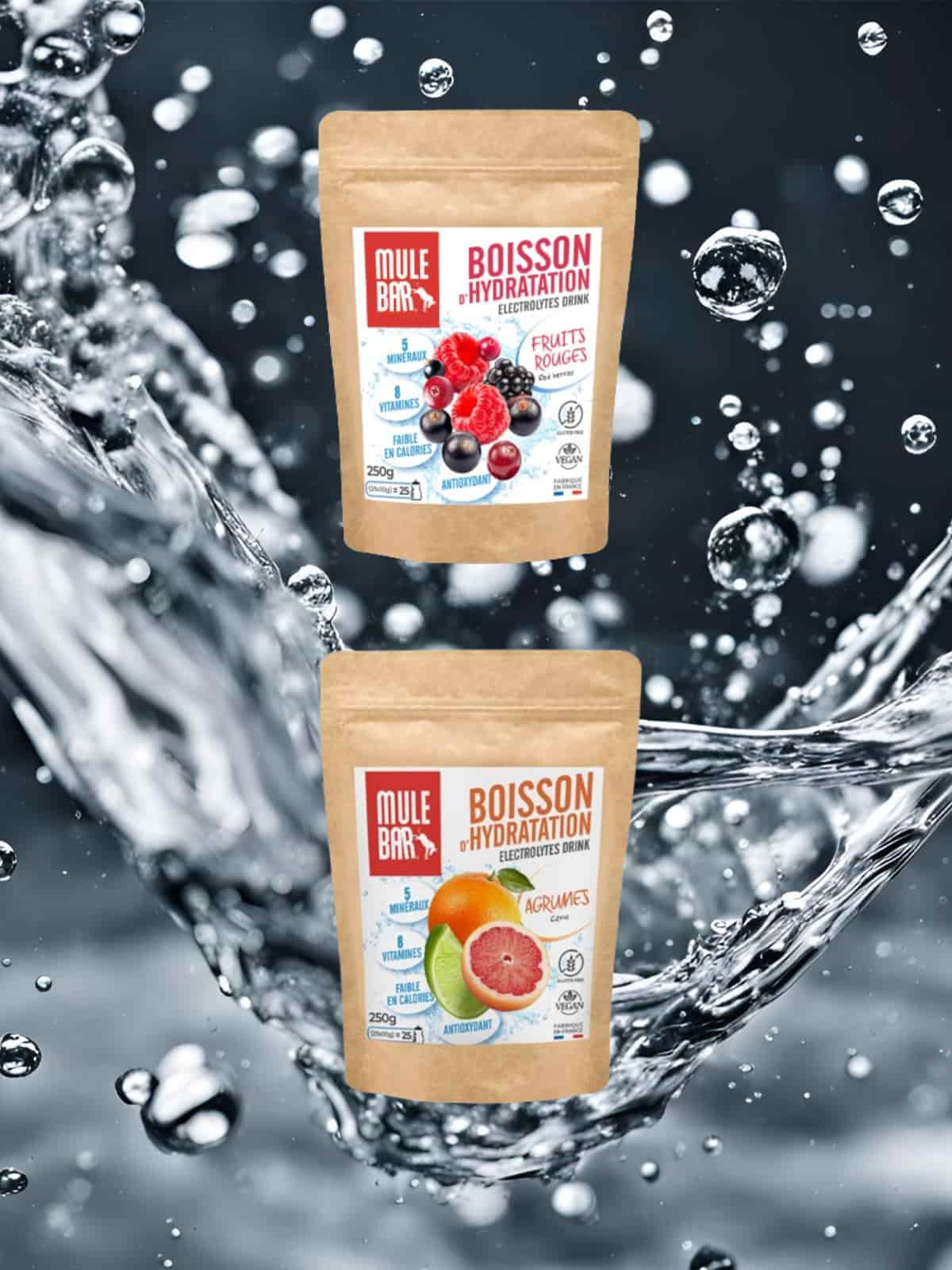
Nutritional values
| For 100g | For 40g | NRV* / 40g | |
|---|---|---|---|
| Energy kJ | 1418 | 567 | |
| Energy Kcal | 355 | 142 | |
| Fat (g) | 0.0 | 0.0 | |
| of which saturated fat (g) | 0.0 | 0.0 | |
| Carbohydrates (g) | 88.6 | 35.5 | |
| of which sugars (g) | 43.8 | 17.5 | |
| Dietary fiber (g) | 0.0 | 0.0 | |
| Protein (g) | 0.0 | 0.0 | |
| Salt (g) | 1.9 | 0.8 | |
| L-Leucine (g) | 1.25 | 0.5 | |
| L-Isoleucine (g) | 0.63 | 0,25 | |
| L-Valine (g) | 0.65 | 0,25 | |
| Sodium (mg) | 754 | 301 | |
| Potassium (mg) | 751 | 300 | 15% |
| of which Bicarbonates (g) | 3.17 | 1.27 | |
| Magnesium (mg) | 140 | 56.0 | 15% |
| Zinc (mg) | 6.75 | 2.70 | 27% |
| Vitamin E (mg) | 9.10 | 3.64 | 30% |
| Vitamin C (mg) | 60.4 | 24.2 | 30% |
| Vitamin B1 (mg) | 1.18 | 0.47 | 43% |
| Vitamin B6 (mg) | 1.05 | 0.42 | 30% |
| Vitamin B2 (mg) | 1.05 | 0.42 | 30% |
| Vitamin B3 (mg) | 12.1 | 4.83 | 30% |
| Vitamin B9 (µg) | 151 | 60.4 | 30% |
| Vitamin D (µg) | 3.78 | 1.51 | 30% |
| *Nutritional Reference Values (UE regulation n°1169/2011) | |||
